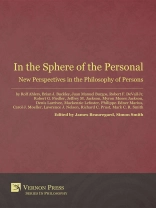The papers in this collection were originally presented at the 13th International Conference on Persons, held at the University of Boston in August 2015. This biennial event, founded by Thomas O. Buford and Charles Conti in 1989, attracts a host of international scholars, both the venerable and the aspiring. It is widely regarded as the premier event for those whose research concerns the philosophical tradition known as ‘personalism’.
That tradition is, perhaps, best known today in its American and European manifestations, although there remains a small but fiercely defended stronghold in Britain. Personalism is not an exclusively Western development, however; its roots are also found in India, China, and Japan.
What unites these disparate intellectual cultures may seem quite small. There is little, if any, methodological or doctrinal consensus among them. They are all, however, responses to the impersonal and depersonalising forces perceived to be at work in philosophy, theology, and, most recently, the natural and political sciences. Their common aim is to place persons at the heart of these discourses, to defend the idea that persons are the metaphysical, epistemological, and moral ‘bottom line’, the vital clue to knowledge of self, reality, and all conceivable values.
The authors in this collection do not simply reflect upon this tradition, they put it to work on a range of philosophical and theological problems, both classical and contemporary; problems of free will, personal identity, and the nature of reality, as well as the very current concerns of environmental philosophers, bio- and neuro-ethicists. Their perspectives, too, are many and varied, so offer profound insights into key debates among other philosophical traditions, such as the Kantian, Hegelian, phenomenological, and process schools.
Зміст
Foreword
by Thomas O. Buford
Introduction
by Simon Smith and James Beauregard
Acknowledgements
1. Personal Identity With and Without Monotheism
by Richard C. Prust
2. Integral Experience: A New Proposal on the Beginning of Knowledge
by Juan Manuel Burgos
3. Neuroethics and Impersonalism: Value Revelation in Subjective Disclosure
by Denis Larrivee
4. Persons and Passions: The Late Cartesian Account
by Mark C. R. Smith
5. Holy Robot? Discourse on Persons and Machines in Early German Idealism
by Rolf Ahlers
6. The Socio-historical Ordeal of Personhood: Nietzsche and Freud
by Jeffrey M. Jackson
7. No Free Pass: Pringle-Pattison’s Ideas on Personhood, the Soul, and Personal Immortality
by Robert F. De Vall, Jr.
8. Self and Person: Distinctions in Bergson
by Robert G. Fiedler
9. Legal Personhood, Prenatal Humans and Feticide Laws
by Lawrence J. Nelson
10. The Consolation Of Philosophers: Rebuilding Dignity And Self After Sexual Assault
by Mackenzie Lefoster
11. Returning to Redemption as a Theory for Justifying Punishment
by Brian J. Buckley
12. Roma-Integration: Existential Tension Between Public Policy and the Person
by Philippe-Edner Marius
13. ‘We Are Not Disposable’: ‘Psychiatric’/Psycho-Social Disabilities and Social Justice
by Carol J. Moeller
14. Personhood in the Board Room: A Schellingian Account of Corporate Agency
by Myron Moses Jackson
Notes on the Contributors
Endnotes
Index












